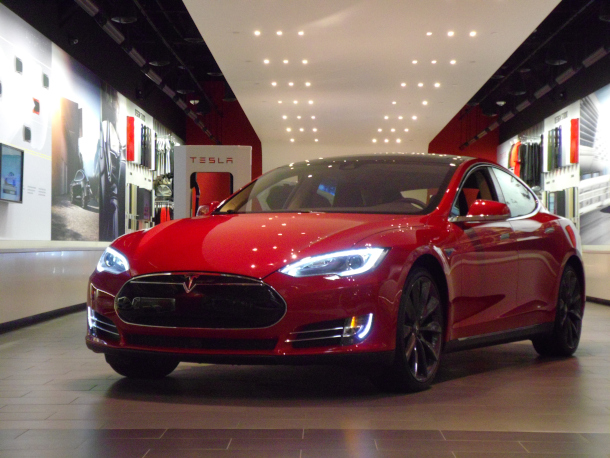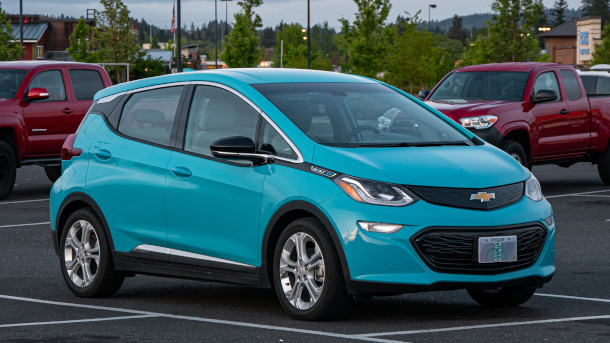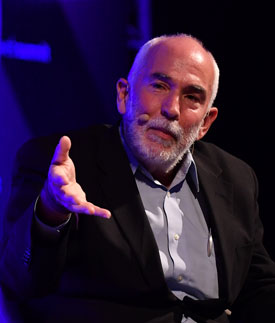EV Price War
Air Date: Week of February 3, 2023

Tesla cut its prices by 20 percent to try to keep market share and stimulate sales. (Photo: Ray, Flickr, CC BY-ND 2.0)
Despite inflation. automakers including Tesla, Ford and General Motors are now in a price war over electric vehicle sales. The lowered stickers also bring some models under the $55,000 price cap required to qualify for federal tax credits. Jim Motavalli, who writes about green transportation for Autoweek and Barrons, joined Host Steve Curwood to discuss what these aggressive price markdowns mean for electric vehicle consumers.
Transcript
CURWOOD: As Peter Dykstra mentioned, Georgia is getting into the electric vehicle business, along with many other places. And automakers have begun fighting for market share by slashing prices for electric models. This electric car price war will likely boost demand and sales. Tesla, Ford, and General Motors have all announced prices cuts to keep some models of electric cars under the 55,000 dollar price cap that’s required to qualify for the federal tax credits of the Inflation Reduction Act. Joining us now to discuss is Jim Motavalli who writes about green transportation for Autoweek and Barrons. Welcome back to Living on Earth, Jim!
MOTAVALLI: It's great to be on Steve.
CURWOOD: So China experienced the Tesla price cuts first, what was the reaction there?
MOTAVALLI: Well, it was surprising was surprising to me. But people reacted very strongly and actually organized demonstrations of angry Tesla owners who paid full price for the cars. And now we're seeing other people getting them cheaper. And you can see that's a normal human reaction when someone else is getting a bargain that you're not getting.
CURWOOD: And I guess in China, they don't have the deal that many companies have here. Hey, if you see a lower price elsewhere, we'll make up the difference. I guess Tesla didn't make up the difference?
MOTAVALLI: Now, it was interesting. When Ford announced similar price cuts, it said that they'd be kind of retroactive to people who'd already ordered the car but not taking delivery, which is, you know it's a decent gesture I would say.
WATCH: Ford follows Tesla with price cuts on its Mustang electric vehicle. The cuts underscore the intensifying competition in the EV market, the fastest growing segment of the auto industry https://t.co/OwZOey1xa9 pic.twitter.com/bFrVTCcuJK
— Reuters Business (@ReutersBiz) January 31, 2023
CURWOOD: Well yeah, and besides who would take delivery, once they saw that a new price was lower? They'd say "excuse me, sorry I'm outta here".
MOTAVALLI: [LAUGH]
CURWOOD: What do these price cuts, what do they mean for us electric vehicle purchase and use? What's the effect on this?
MOTAVALLI: The effect is to make electric car prices a lot closer to comparable internal combustion engine cars, which I think has been a long time coming and is very good to see. One of the main complaints about electric cars is how expensive they are. People don't necessarily factor in the fact that the operating costs are a lot lower and your out of pocket costs over time are probably going to be lower. Those high initial prices are very off putting to people, there was also a major incentive for automakers to get the price of their car below $55,000. Because that is the federal threshold now for giving the $7,500 federal income tax credit under the new Biden rules.
CURWOOD: So why is this happening now? Why lower the price of an EV now?
MOTAVALLI: I think the major reason is the whole field is getting more competitive. If you look at the last several years, Tesla virtually had EVs to itself and that's reflected in the market share that Tesla had in the EV field. It's like, huge percentage of the EV sold where Tesla's all around the world. And today we're seeing the rise of mainstream automakers putting out their EV efforts. I think initially, a lot of them weren't that great, but by now we've reached the point where there's cars that are very competitive with Tesla. And I certainly would see people weighing buying a Tesla against other comparable cars as some that sound better than Tesla. And of course, Elon Musk hasn't done himself any favors with his antics recently. So that probably turned some people off Tesla.
CURWOOD: Now, what role do battery costs play in all of this? You know, batteries have been historically really expensive.
MOTAVALLI: I think one of the factors that automakers are able to reduce prices on their cars is that battery costs have been coming down. If you look at the history of the EV battery, when we first started manufacturing EVs, the first EV conversions that were done in the 80s and 90s they were using lead acid batteries that were essentially unchanged from the 1920s when we basically abandoned the electric car revolution at that point, but then we started applying quite a bit of research to batteries. And that led to the lithium ion battery that's the standard today. And increasing efficiency and building batteries, reduced use of rare earth metals, which is one of the major reasons they cost a lot. And you know, they have other problems besides being expensive, they're also sourcing from them is very problematic. Like the cobalt used in electric vehicle batteries 65 percent of it or more comes from the Democratic Republic of the Congo, it's produced under very inhumane conditions, very unhealthy environmental conditions. So that is a major incentive for automakers to try to reduce the amount of cobalt or actually get to no cobalt and the batteries. And all this has had the effect of bringing the costs of batteries down and the battery is the major cost center in the car. So if you can reduce the cost of the battery, then you can reduce the cost of the car. So I think that's a factor here.

Pictured above is a 2020 Chevrolet Bolt. Following Tesla’s price cuts General Motors (GM) announced an approximate $6,000 price drop for both the 2023 Chevrolet Bolt EV hatchback and Bolt EUV SUV opening the door for more affordable EV options. (Photo: mlokren, Flickr, CC BY-NC 2.)
CURWOOD: Now, the traditional thing you say about costs and owning an EV is upfront, you spend a bit more but then there are fewer things to go wrong, so repairs or less. Of course the fuel cost even if electric prices are higher still below the equivalent gasoline. At what point do you think we cross over, that infact an EV isn't gonna cost any more up front than a fossil fuel power mobile?
MOTAVALLI: I think we're getting close to that now, I don't think that'll take very long. If you look at the average price people pay for the cars, you'd be surprised how high it is. I mean, it's around high 30s is the average is the price of an internal combustion car. So when you hear that EVs are selling for 45 around in there, we're not that far apart. And as you said, if you factor in the much lower cost of operating them, then you have to look at, okay, what point does a little extra money I paid get swallowed up by the lower operating costs. So what's my payback range, it might be two or three years or something like that. It's not a long time. And people keep a car for an average of 11 years. So you're going to definitely come out ahead if you own an EV now.
CURWOOD: And of course, you have in certain cases where people's income qualifies you have the tax credit, the big federal tax credit $7,500 bucks, that really addresses the gap between EVs and fossil fuel powered cars.
MOTAVALLI: And of course, it's an incentive for the automakers to reduce their prices to get their vehicles under that price cap. And a price cap for trucks is $80,000. So they were able to get their truck below that, then they're going to sell a lot more trucks, because the price point will be very attractive to people get that tax credit.

Jim Motavalli is a freelance environmental journalist and blogger for Autoweek and Barrons (Photo: Seb Daly, Web Summit, Wikimedia Commons, CC BY 2.0)
CURWOOD: So these price cuts should attract more consumers to buy an EV but what about range anxiety? Where are we with range anxiety in this society? I mean, how's that built out of the EV charging networks going at this point?
MOTAVALLI: Range anxiety is a very real thing. When I had the first EVs like that Nissan LEAF, or the Mitsubishi Iv, which is another one that was out early on. That thing was so range challenged it was ridiculous. I mean, in cold weather, I was seeing range of about 35 miles. And you know, you would hardly, you wouldn't even make it to grandma's house [LAUGH] at that rate. Today the average EV has maybe 300 miles of range, or maybe 250 around there, that's pretty good. And there is a public charging network. We have something like 10,000, public EV chargers around the country, and most of those have multiple charge points. And if you want a Tesla, you're really in good shape because the supercharger network is so good. If you don't own a Tesla, you're less supported but there, there's the Electrify America network and others. But I think there is more compatibility now with with charging. I'm not saying range anxiety is no longer a factor is definitely not as much of one.
CURWOOD: In certain states, there's pushback against having an electric car mandate. Some politicians say this is taking away people's freedoms. What do you think?
MOTAVALLI: Well, there are campaigns by the Koch brothers and others to shore up internal combustion cars, I've noticed that they put a lot of money into that. Oil companies are against it also. But I think that the realities of climate change are such that you can't just give people free range in choosing what car they buy. We can't have that going forward, we need to eliminate tailpipe emissions. I don't see any way around that, given the imperatives. You know, I wrote a book in 2004 called feeling the heat that looked at climate change impacts that you could visually see at that time. And there was quite a lot of them in 2004. Today, there's a whole lot more. I mean, the glaciers are obviously melting, the seas are obviously rising, the weather has gotten completely screwing us. So you know, it's not like the planet isn't telling us what we need to do. And I think unfortunately we've failed to meet a lot of our goals but I do think we are actually going to apply this one and get out of internal combustion. And the electric car is at this point better than the internal combustion car. We're not asking you to do any kind of hardship. It is a really good car that, is faster than your internal combustion car, is quieter, is better on every metric than the internal combustion cars. So you know, nobody has to wear a hair shirt over this thing.
CURWOOD: Jim Motavalli is a blogger with Barron's and Auto Week. Jim, thanks so much for taking the time with us today.
MOTAVALLI: Hey, it was great to be on Steve.
CLARIFICATION: GM was the first auto major to cut its electric car prices when it reduced the price of its Chevy Bolt by $6,000 in June 2022. In January 2023 GM undid a bit of the cut by raising the sticker price for a Bolt by a few hundred dollars.
Links
Reuters | "As Tesla Ignites an EV Price War, Suppliers Brace for Musk Seeking Givebacks"
The Verge | "Tesla's Price Cuts Mean a Major Shift in the EV Market"
Living on Earth wants to hear from you!
Living on Earth
62 Calef Highway, Suite 212
Lee, NH 03861
Telephone: 617-287-4121
E-mail: comments@loe.org
Newsletter [Click here]
Donate to Living on Earth!
Living on Earth is an independent media program and relies entirely on contributions from listeners and institutions supporting public service. Please donate now to preserve an independent environmental voice.
NewsletterLiving on Earth offers a weekly delivery of the show's rundown to your mailbox. Sign up for our newsletter today!
 Sailors For The Sea: Be the change you want to sea.
Sailors For The Sea: Be the change you want to sea.
 Creating positive outcomes for future generations.
Creating positive outcomes for future generations.
 Innovating to make the world a better, more sustainable place to live. Listen to the race to 9 billion
Innovating to make the world a better, more sustainable place to live. Listen to the race to 9 billion
 The Grantham Foundation for the Protection of the Environment: Committed to protecting and improving the health of the global environment.
The Grantham Foundation for the Protection of the Environment: Committed to protecting and improving the health of the global environment.
 Contribute to Living on Earth and receive, as our gift to you, an archival print of one of Mark Seth Lender's extraordinary wildlife photographs. Follow the link to see Mark's current collection of photographs.
Contribute to Living on Earth and receive, as our gift to you, an archival print of one of Mark Seth Lender's extraordinary wildlife photographs. Follow the link to see Mark's current collection of photographs.
 Buy a signed copy of Mark Seth Lender's book Smeagull the Seagull & support Living on Earth
Buy a signed copy of Mark Seth Lender's book Smeagull the Seagull & support Living on Earth

